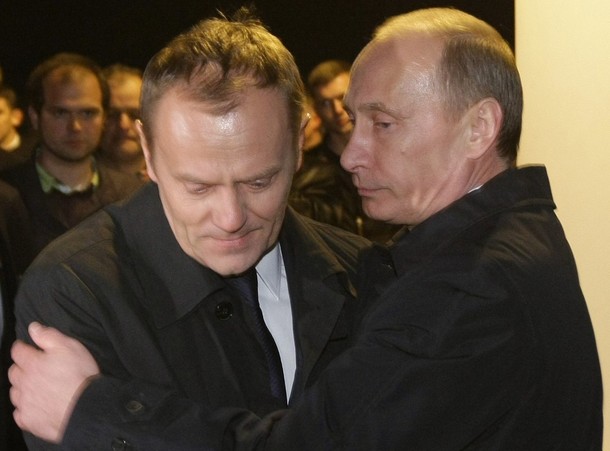
Will the tragic plane crash over Smolensk that killed 96 of Poland’s top political elite provide the opening for a less fraught and more productive Russian-Polish relationship? That would require both countries coming to terms with a contested history, and with policy differences over the joint EU- Russia neighborhood, pipeline politics and broader questions of Euro-Atlantic security. So far, the signs are promising, but major challenges lie ahead.
More than three centuries of ambivalent relations with often diametrically opposed historical narratives have confronted Russians and Poles in dealing with each other. One of the most sensitive of these “difficult questions” is the massacre of 22,000 of the Polish military and political elite by Soviet forces in 1940, which President Kacysnki and his colleagues were flying to commemorate when their plane went down.
In 1940, the Soviets wanted to eliminate the Polish elite that could have governed an independent postwar Polish state. Indeed, Molotov himself called Poland the “bastard of Versailles.” Yet, until the Gorbachev era, the Soviets insisted that the Nazis had murdered the Polish officers and intellectuals after the beginning of Operation Barbarossa in 1941. Prime Minister Putin’s participation last September in ceremonies in Poland commemorating the seventieth anniversary of the outbreak of World War Two, his admission that the Soviets were responsible for the Katyn massacre, and his participation in ceremonies commemorating Katyn two weeks ago together mark a significant step forward in ties between Moscow and Warsaw.
As we know from archives that have been opened since the collapse of Communism, Polish-Soviet relations were problematic from the start, even during the era when many in the West believed that there was a monolithic Soviet bloc.
After the collapse of USSR, the relationship was largely put on hold. Poland, with help from its European partners, especially Germany, rapidly consolidated the institutions of democracy and the market, eventually joining both NATO in 1999 and the European Union in 2004. Russia, meanwhile, confronted the enormous challenge of consolidating a post-Communist society and redefining its foreign policy. During the Yeltsin, era, only sporadic attention was paid to Central and Eastern Europe as Poland became integrated into Euro-Atlantic structures. During Putin’s first term, he visited Poland, met with President Kwasniewski and it appeared that the relationship might develop a more positive dynamic. Yet little progress was made in creating a genuine rapprochement between Moscow and Warsaw.
Poland has already experienced one successful attempt at reconciliation with a former adversary, namely Germany. The rapprochement began forty years ago and was initiated by the West Germans, who took responsibility for Nazi Germany’s actions and, among many other policies, worked hard to create school textbooks to be used in both countries that gave an accurate depiction of historical events that was acceptable to both sides. The situation with Russia is not analogous, yet Putin’s recognition of the USSR’s responsibilities for Katyn is a promising start. Russia and Poland have formed a Joint Historical Commission on Difficult Issues, co-chaired by Russian academician Andrei Torkunov and former Polish Foreign Minister Professor Adam Rotfeld, to examine all the contentious historical issues that have long bedeviled the relationship. It has been working for some time on seeking to reconcile the dueling narratives about Russian-Polish relations.
The Russian leadership’s reaction to the tragedy last week suggests that Moscow’s policies toward Warsaw are changing. Putin went to the crash site, demonstratively supported Prime Minister Donald Tusk when he arrived there, and has taken charge of the investigation into the crash. President Medvedev attended Kaczynski’s funeral and led a delegation to sign the condolence book at the Polish embassy in Moscow. In times of national tragedy, these gestures are important, and many Poles have reacted favorably to them.
The road to a viable Russian-Polish rapprochement will be lengthy. Russia has objected to Poland’s staunch support of the United States and its leading role in the group within the EU that favors more hard-nosed policies toward Russia. Moscow also objected to Kaczynski’s support for Georgian President Saakashvili during the 2008 Russian-Georgian war and to Warsaw’s desire to host U.S. missile defense components on Polish soil. Poland has objected to what it sees as Russia’s attempts to restore its influence in the former Soviet states, prevent any further NATO enlargement and dissuade the United States from deploying missile defense components in Central Europe. It also views the Russian-German Nord Stream gas pipeline that bypasses Poland as a potential threat to the security of Poland’s gas supplies. Opposing historical narratives underlie mutual suspicions, but there are also real policy differences over issues such as Euro-Atlantic security architecture.
Since the advent of the Obama administration, however, Polish views of the United States have been changing, and the Russian leadership has realized this as it has pursued its own ”reset” with Washington. The White House’s decision not to deploy missile defense interceptors on Polish soil and perceptions in Poland that the United States is paying less attention to Poland and to Central Europe than under the Bush administration have impacted public and elite opinion. And Russia’s reaction to the air disaster has reminded Poles of the benefits of lessening tensions with their large neighbor.
Of course, much will depend on the outcome of the Polish and Russian investigations into the plane crash and of the upcoming Polish elections. Nevertheless, Katyn 2010 could harbor the beginning of a “reset” in Russian-Polish relations, one based on pragmatism and agreement to cooperate on issues of mutual interest as both societies continue to deal with their common and contested past.
Angela Stent, a nonresident senior fellow with the Transatlantic Relations program at the Atlantic Council, is Director of the Center for Eurasian, Russian and East European Studies in Georgetown University’s School of Foreign Service. Photo credit: Reuters Pictures.
Image: putin-tusk-embrace.jpg
